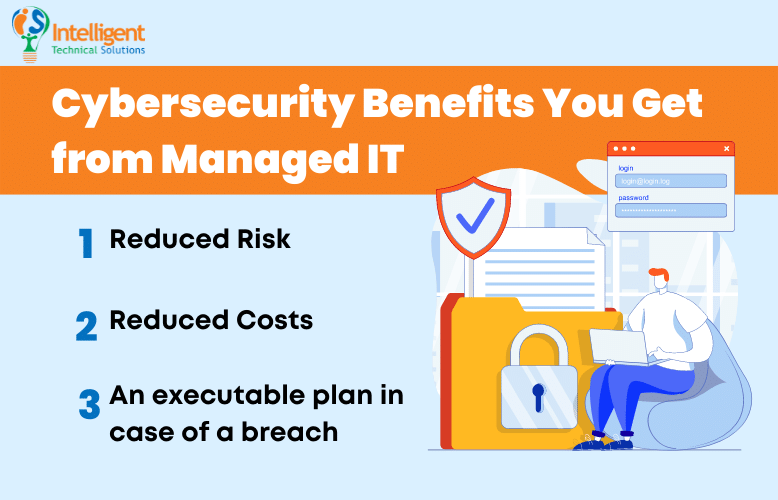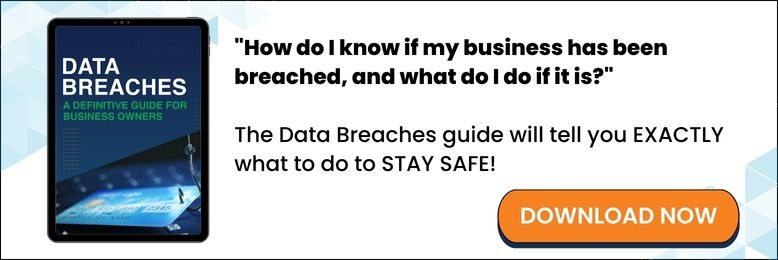Absolute Cybersecurity? Why a 100% No-Breach Guarantee is Impossible
November 18th, 2022 | 4 min. read
%20(77).jpg)
Cyber-attacks are nothing new, but they’ve become increasingly common and sophisticated in recent years.
Still, many business owners don’t realize that simply putting a firewall in place doesn’t mean they can rely on it being 100% effective—especially when their service providers promise something as impossible as a “no-breach guarantee.”
As a Managed IT service provider, Intelligent Technical Solutions (ITS) knows how crucial it is to have guarantees and, more importantly, to be honest about it.
In this article, we’ll answer the following questions:
- What is a breach guarantee?
- Why is a 100% no-breach guarantee impossible?
- How can you reduce your risk of a breach?
- What kind of security can you really expect from Managed IT?
By the end of this article, you’ll have a bigger picture understanding of cybersecurity--and what you can do to achieve at least close to 100% protection.
What is a Breach Guarantee?
First things first, let’s define what a breach is. In its Data Breach Investigations Reports, Verizon defines a breach as an incident resulting in the confirmed disclosure of data to an unauthorized party, not just potential exposure. It’s different from a security incident, and this distinction is important.
“When we use the word ‘breach,’ it really elevates the level of severity,” Rob Schenk, an ITS Partner, said.
A breach guarantee is a written or verbal promise that if a company suffers a data breach, the guarantor will reimburse you for all costs related to the incident, including legal fees and lost time. Some providers even go so far as offering further monetary and service compensation — but that’s rarer.
It’s tempting to think of these guarantees as guarantees in the traditional sense: something that can’t fail. But unlike most contracts or warranties, breach guarantees are more like promises than legally binding contracts; they’re not legally enforceable, and there’s no standard way of offering them (which means there may be gaps in how your company handles them).
Why is a 100% No-Breach Guarantee Impossible?
A company offering a no-breach guarantee is often trying to do two things:
1. To be seen as trustworthy by the consumer
A business that says it has never had a breach will be seen as more trustworthy than one that has had breaches in the past. This can help attract new customers or keep existing ones loyal (and not switch to competitors).
2. Reduce customer anxiety about the security and privacy of their data
If a company can offer the promise of 100% security, then consumers have no reason to worry about what might happen to their personal information.
But you should not expect to receive a 100% no-breach guarantee from any Managed IT provider, and here’s why:
The risk of a breach is ever-present.
The level of risk may vary depending on your industry. Still, data breaches happen all the time, even for companies that follow all best practices and have strong security programs.
The risk isn’t limited to a particular industry or type of data. This is true even if you’re an IT company like us that provide services that businesses across every industry rely on daily. Our attackers know they can find valuable information by going after us (or anyone else providing similar services).
To keep up with attackers, we continuously monitor our network for signs of trouble and take steps to minimize the impact if any signs of infiltration or data theft occur on our systems at any time.
Peter Swarowski, ITS Director of Operations, said, “There is no magic bullet. Cybersecurity is about taking a mindset of assuming a breach.”
It’s not a matter of IF you’ll be breached; it’s a matter of WHEN.
The question businesses should be asking their Managed IT provider isn’t “will I be breached?” but “What can you do when I am?”
Read: “How Do MSPs Stay Secure in 2022? (& Ways to Verify Their Security)”
3 Rules in a Cybersecurity System

The most important thing to realize is that while a 100% no-breach guarantee is impossible, this doesn’t mean you should stop trying to do everything in your power to reduce the risk of a cyber-attack.
There are three things we don’t recommend doing when it comes to protecting your business from cyber-attacks:
1. Don’t rely solely on technology.
Cybersecurity threats constantly evolve, so relying on just one solution will leave you vulnerable. Instead, use multiple forms of protection, including backup plans, firewalls, antivirus software, and physical security measures like locks and guards for on-site systems.
2. Don't ignore the human error.
We all make mistakes—whether it’s sending an email before proofreading or clicking “OK” instead of “Cancel.” While these mistakes aren’t intentional, they can still cause some damage if left unchecked.
To prevent this kind of problem from happening and avoid potential lawsuits because someone sent sensitive data over email, you need reliable training procedures that include regular reminders about cybersecurity best practices.
3. Don’t wait too long for updates.
Many companies wait before installing security patches for software vulnerabilities. This leads to a window of opportunity for hackers to exploit the previous gaps and sneak into your system.
What Cybersecurity Benefits Do You Get from Managed IT?

Here are the top three advantages you’ll get from hiring an MSP:
1. Reduced risk
MSPs significantly lessen the risk of a breach. They’ll be able to put systems in place that will make everything easier to secure, including your technology and your people.
Generally, a company specializing in one thing can do it better than a company that does everything itself—especially if “everything” includes security, where many companies lack expertise or resources due to their size or position in the marketplace.
Their experience with other companies will ensure a better, professional cybersecurity process for your business.
2. Reduced costs
Buying every cybersecurity software and hardware while employing a dedicated cybersecurity team is expensive. A Managed IT Service Provider can leverage their business model and expertise to keep costs lower than if you were to do everything yourself.
3. An executable plan in case of a breach
Lastly, an MSP will handle everything if you experience a breach. You won’t have to worry about losing data, restoring data, or dealing with downtime. Your MSP will do everything in its power to ensure you’ll never have to struggle with the fallout of a breach.
Ready to Get Cybersecurity for Your Company?
Overall, there is no such thing as a 100% cybersecurity guarantee. Instead, expect an MSP to help you reduce risks and costs and set up a plan to secure your business in case of a breach.
If your current MSP offers you an absolute guarantee, it’s time to switch. Watch our “Everything You Need to Know About Switching IT Providers” video for more information.
But if you’d like to know more about cybersecurity in general, here are some available readings for you:
Kharmela Mindanao is a senior content writer for Intelligent Technical Solutions. She’s called Ella by her friends and likes yoga, literature, and mountain climbing. Her favorite book is Anxious People by Fredrik Backman. She creates art and poetry and is on a quest to find the best cheesecake.
Topics:

